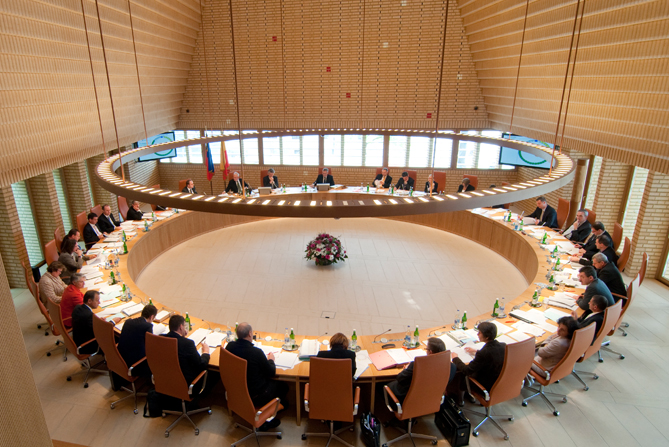Plenary Assembly
The Liechtenstein Parliament – the Landtag – consists of 25 members. It exercises its rights in the sessions of the complete Landtag. Deliberations on laws are also usually carried out in the Plenary Assembly. This is why the Landtag is described as a “working Parliament“. In comparison with other parliaments, not many tasks are delegated to commissions. When commissions are formed, it is mainly the case that they only have to prepare certain aspects of business for the complete Landtag and to formulate the corresponding motions.
Members of the Landtag

All the members of the Landtag are “part-time Parliamentarians”, i.e., they have a political function but follow their occupation at the same time. They receive an all-in remuneration of CHF 20,000 per year and a daily allowance of CHF 300 (or CHF 200 for a half-day). In addition, they receive the same sum for preparatory work for each day that Parliament is in session. Members of the Landtag cannot be held legally accountable for their remarks in Parliament. They enjoy immunity to the extent that during the Parliamentary session they may only be arrested subject to the consent of the Landtag (except when they are caught in the act).
The President and the Vice-President of the Landtag
The President of the Landtag and the Vice-President are each elected for the current year at the Opening Session. The President of the Landtag convenes the sessions in the course of the year; he chairs the sessions and represents the Landtag externally. The Vice-President of the Landtag represents him when he is not available.
Bureau of the Parliament
The Bureau of the Parliament consists of the President of the Landtag, the Vice-President and the spokespersons for the groups. The Landtag Secretary belongs to it in an advisory capacity. The Bureau of the Parliament advises the President, especially when the agenda for the sessions of the Landtag is drawn up. It prepares the budget of the Landtag and decides the employment of staff for the Parliamentary Service.
Clerks
In the opening session each year, the Landtag traditionally elects two Clerks who count the votes. In the past, they also had to keep the minutes and to read out the drafts.
Parliamentary Groups
The Parliamentary Groups form a bridge between the Parties and the Members. Before a matter is discussed in the Landtag, the Members come together in internal Party meetings of the Groups. These serve for Group opinionforming. This does not mean there is a Party whip but a certain Group discipline does apply. The opinion of the Group is made known in the Landtag by the Group spokesperson. The Groups are entitled to their own conference room. To form a Parliamentary Group, there must be at least three members.
National Committee
The National Committee exercises the rights of the Landtag when the Landtag is not in session and therefore cannot exercise its functions (i.e., from the adjourning of Parliament at the end of one year to its reopening at the beginning of the following year, or in the case of the suspension or dissolution of the Landtag). The National Committee consists of the President of Parliament and four other members whereby the two electoral districts must be equally represented. The National Committee cannot enter into permanent obligations for the country.
Rules of Procedure
The duties and method of work of the Landtag are governed by the Constitution, the Conductance of Business Act and the Rules of Procedure.